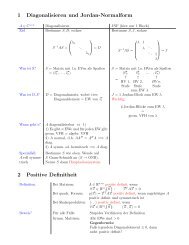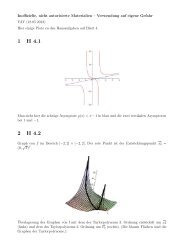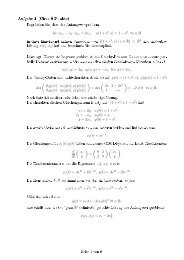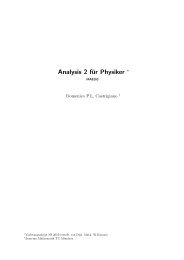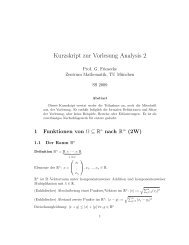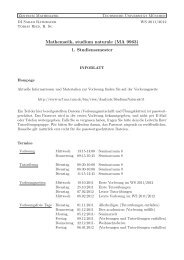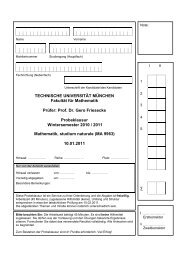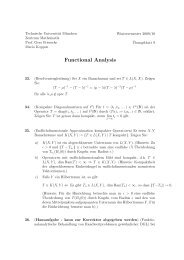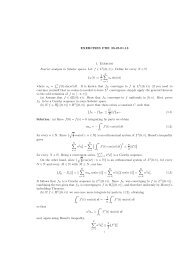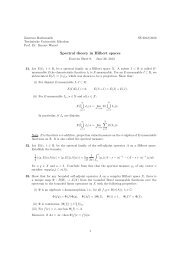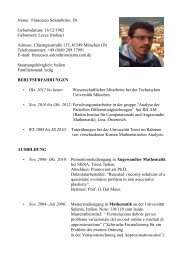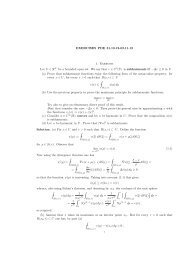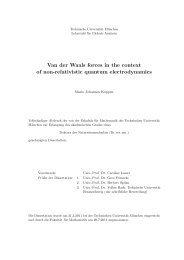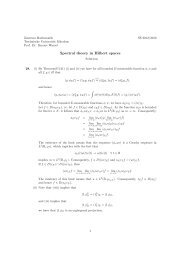Weak Convergence Methods for Nonlinear Partial Differential ...
Weak Convergence Methods for Nonlinear Partial Differential ...
Weak Convergence Methods for Nonlinear Partial Differential ...
Erfolgreiche ePaper selbst erstellen
Machen Sie aus Ihren PDF Publikationen ein blätterbares Flipbook mit unserer einzigartigen Google optimierten e-Paper Software.
contained in a compact subset of W −1,2 (Ω). In fact, it even is a null-sequence in<br />
that space: Viewing the smooth function εΦ(u ε ) xx ∈ W −1,2 (Ω) as a distribution<br />
extended to a linear functional on W 1,2<br />
0 which acts on test functions ϕ (and hence<br />
all ϕ ∈ W 1,2<br />
0 ) through ϕ ↦→ ∫ εΦ(u ε ) xx ϕ, we can estimate<br />
{∫<br />
}<br />
‖εΦ(u ε ) xx ‖ W −1,2 = sup ε Φ(u ε ) xx ϕ : ϕ ∈ W 1,2<br />
0 , ‖ϕ‖ W<br />
1,2 = 1<br />
0<br />
{ ∫<br />
}<br />
= sup ε Φ(u ε ) x ϕ x : ‖ϕ‖ W<br />
1,2 = 1<br />
0<br />
{ √ε<br />
≤ sup ‖Φ ′ (u ε )‖ L ∞‖ √ εu ε x ‖ L 2‖ϕ x‖ L 2 : ‖ϕ‖ W<br />
1,2<br />
0<br />
≤ C √ ε,<br />
}<br />
= 1<br />
where we have used Φ(u ε ) x = Φ ′ (u ε ) u ε x in the second step and Lemma 3.7 in the<br />
fourth step. Lemma 3.5 now implies the claim.<br />
u ε being a solution of (3.8) we have<br />
∫ ∞ ∫ ∞<br />
0<br />
−∞<br />
u ε ϕ t + F(u ε ) ϕ x + εu ε ϕ xx dxdt +<br />
∫ ∞<br />
−∞<br />
g(x) ϕ(x, 0) dx = 0<br />
<strong>for</strong> any ϕ ∈ Cc ∞ (R × [0, ∞)). As a consequence of the above claim we can<br />
now deduce from Theorem 3.4 that F(u ε ) ⇀ ∗ F(u). With Ω bounded such that<br />
supp ϕ ⊂ Ω we finally get that indeed<br />
∫ ∞ ∫ ∞<br />
0<br />
−∞<br />
u ϕ t + F(u) ϕ x dxdt +<br />
∫ ∞<br />
−∞<br />
g(x) ϕ(x, 0) dx = 0,<br />
which shows that u is an integral solution.<br />
If there is no interval on which F is affine, then also u ε → u strongly in any<br />
L p , p < ∞. But then<br />
∫ ∞<br />
∫ ∞<br />
0<br />
−∞<br />
∫ ∞<br />
Φ(u) ϕ t + Ψ(u) ϕ x dxdt = lim<br />
ε→0<br />
0<br />
∫ ∞<br />
−∞<br />
Φ(u ε ) ϕ t + Ψ(u ε ) ϕ x dxdt ≥ 0.<br />
Remark 3.9 Other methods show that in fact there always exists an entropy solution.<br />
The proof by compensated compactness, however, appears most amenable<br />
to systems of conservation laws. But little is known rigorously <strong>for</strong> such systems.<br />
We conclude the section by making the remark that the entropy condition<br />
does indeed single out a unique integral solution:<br />
Theorem 3.10 There exists at most one entropy solution of (3.2).<br />
A proof of this statement can be found, e.g., in [Ev 98]. (XXX)<br />
70<br />
□



